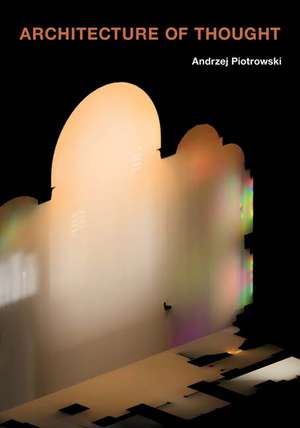Architecture of Thought
Autor Andrzej Piotrowskien Limba Engleză Paperback – 4 mai 2011
In Architecture of Thought, Andrzej Piotrowski maps and conceptually explores material practices of the past, showing how physical artifacts and visual environments manifest culturally rooted modes of thought and participate in the most nuanced processes of negotiations and ideological exchanges. According to Piotrowski, material structures enable people to think in new ways—distill emerging or alter existing worldviews—before words can stabilize them as conventional narratives.
Combining design thinking with academic methods of inquiry, Piotrowski traces ancient to modern architectural histories and—through critical readings of select buildings—examines the role of nonverbal exchanges in the development of an accumulated Western identity. Unlike studies that organize around the traditional scheme of periodization in history, Architecture of Thought uses an interdisciplinary approach to investigate a wide spectrum of cultural productions in different times and places.
Operating from the assertion that buildings are the most permanent record of unself-conscious beliefs and attitudes, it discusses Byzantium and the West after iconoclasm, the conquest and colonization of Mesoamerica, the Reformation and Counter-Reformation in Eastern Europe, the rise of the culture of consumerism in Victorian England, and High Modernism as its consequence. By moving beyond the assumption that historical structures reflect transcendental values and deterministic laws of physics or economy or have been shaped by self-conscious individuals, Piotrowski challenges the traditional knowledge of what architecture is and can be.
Preț: 183.46 lei
Preț vechi: 236.95 lei
-23% Nou
Puncte Express: 275
Preț estimativ în valută:
35.11€ • 37.54$ • 29.27£
35.11€ • 37.54$ • 29.27£
Carte indisponibilă temporar
Doresc să fiu notificat când acest titlu va fi disponibil:
Se trimite...
Preluare comenzi: 021 569.72.76
Specificații
ISBN-13: 9780816673056
ISBN-10: 0816673055
Pagini: 408
Ilustrații: 162
Dimensiuni: 178 x 254 x 20 mm
Greutate: 0.91 kg
Ediția:1
Editura: University of Minnesota Press
Colecția Univ Of Minnesota Press
ISBN-10: 0816673055
Pagini: 408
Ilustrații: 162
Dimensiuni: 178 x 254 x 20 mm
Greutate: 0.91 kg
Ediția:1
Editura: University of Minnesota Press
Colecția Univ Of Minnesota Press
Notă biografică
Andrzej Piotrowski is associate professor in the School of Architecture, University of Minnesota. He is coeditor of The Discipline of Architecture (Minnesota, 2001).
Cuprins
Acknowledgments
Introduction: The Moving Target of Architecture
1. Architecture and Medieval Modalities of Thought
2. Colonization and Symbolic Reality in Mesoamerica
3. Structures of Tolerance and Religious Domination
4. Technologies of Thought in Victorian England
5. High Modernism According to Le Corbusier
Closing Remarks: The West
Notes
Illustration Credits
Index
Introduction: The Moving Target of Architecture
1. Architecture and Medieval Modalities of Thought
2. Colonization and Symbolic Reality in Mesoamerica
3. Structures of Tolerance and Religious Domination
4. Technologies of Thought in Victorian England
5. High Modernism According to Le Corbusier
Closing Remarks: The West
Notes
Illustration Credits
Index
Recenzii
"Ambitious in its historical and geographical scope, Architecture of Thought traces conflicting religious, political, and symbolic complexities in architecture that have been overlooked. Against the rational systems of Western thinking, with their emphasis on language, human intentionality, and forces of power, Andrzej Piotrowski probes places, buildings, and spatial practices that have eluded architectural history. This is timely and innovative analysis that will be of interest to historians and to practitioners of architecture and design." —Bronwen Wilson
"Architecture of Thought is written with passion as well as learning. Andrzej Piotrowski draws material from amazingly diverse sources, in a refreshing approach to familiar and unfamiliar architecture alike." —Charles Burroughs
Descriere
An innovative examination of how material practices and constructed environments have shaped cultures.
